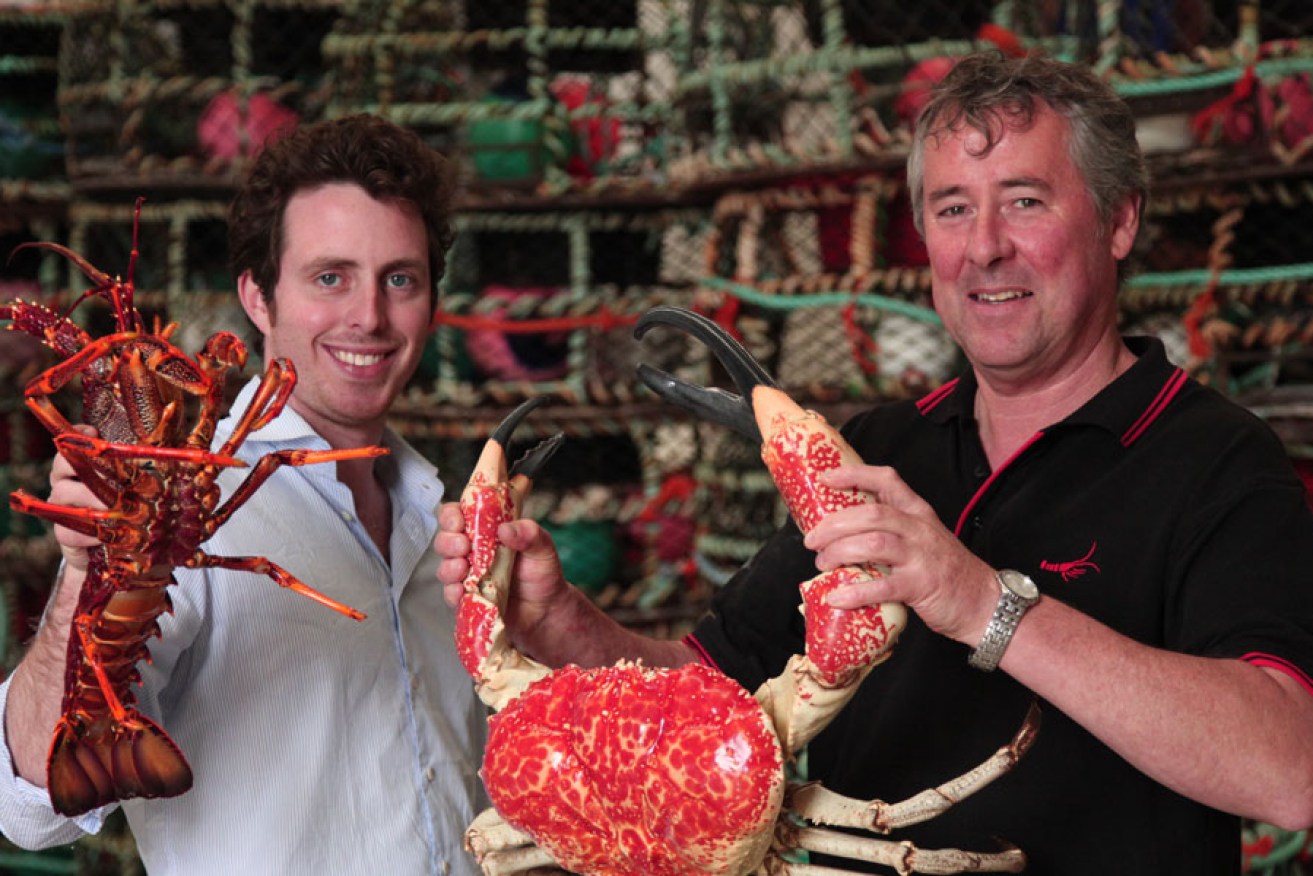FTA a bonus for SA seafood exporter

Andrew Ferguson (right) in Ferguson Australia’s Kangaroo Island facility with visiting German fish industry executive Anton Faber-Castell.
Australia’s falling dollar and a new Free Trade Agreement with China have brought a smile to many managing directors’ faces in recent weeks, but Andrew Ferguson is positively beaming.
The FTA will mean not only that he will be able to get premium lobster into China more quickly and efficiently, but also that every shipment can carry the Ferguson Australia brand.
Current regulations require him frequently to export via intermediaries in neighbouring countries such as Vietnam. Chinese customers know they are buying Australian lobster (the one they consider the “Grange” of the species), but not necessarily whose.
Putting a name on the boxes and having even greater control over quality will help further improve the margins on a product that already attracts more than $100 a kilo, as well as opening the marketing door for value-added products.
With demand for Southern Rock lobster always exceeding supply, things seem pretty rosy for the Hendon-based company but, after 40 years in the industry and 14 running his current business, Ferguson is only too aware of how things can turn.
“Ten years ago it was going really well for us as the Chinese live lobster market started to boom, but then SARS hit, the Chinese stopped going out, and demand fell away,” he said.
Four years later the global financial crisis had the same impact on an expanding business selling a range of seafood products into Europe (helped, to no small extent, by taking out the top prize at Europe’s most prestigious seafood awards).
Good timing, forward thinking and niche marketing have helped Ferguson Australia weather most storms, however.
“We’ve really concentrated on the whole-of-chain process in our marketing and we pride ourselves on delivery,” Ferguson said. “It’s about understanding that we’ve got to have certain size lobsters in the tanks so product is available for our important customers as they demand it. It’s not just chopping and changing and grabbing opportunities.”
The company now sells 180,000 tonnes of live lobster a year into China (accounting for 75% of its total business) and was named the State’s best agribusiness exporter for 2014.
It is also a significant supplier to the local market, providing seafood, seafood products and condiments to more than 250 restaurants, hotels and wineries.
“We are probably the only company in the State that only sells Australian seafood – no imports,” Ferguson said. “Because we export we have to have very strict procedures for our accreditation, and we stick with the same regime for the local market.”
The company now employs 40 people and owns or leases boats on Kangaroo Island, Port Lincoln and Pondalowie Bay on Yorke Peninsula.
It remains a family business, with Andrew’s wife his fellow director, his son heading international marketing, one daughter in charge of export documentation and marketing, and the other soon to return after a stint working for South Australia’s Agent General in London.
The story began in Cape Jaffa, where Ferguson worked as a deckhand for his father before buying his own boat and eventually moving the operation to Victor Harbor, to fish the waters around KI.
In 2000 he began looking to expand his horizons and researched the potential of products such as lobster medallions and lobster oil, as well as how to utilise the lesser quality lobsters in the catch.
The action was already moving to the Chinese live lobster trade (taking over from the previously dominant US lobster tail market) but at that stage the Chinese only wanted lobsters of a certain size and – as now – the very best quality.
Developing new products maintained the company as SARS took its toll on the Chinese side of things, and the quest to do as much as possible with every lobster continues.
Ferguson is working with the Centre for Marine Bioproducts Development at Flinders University and with SARDI to develop products from the bits of the lobster nobody wants, such as the head and shell.
“Anything that doesn’t make the premium grade can go into other products and the waste from that can go into natural flavouring products if we can get it right,” Ferguson said. “It’s exciting because if we get it sorted we can label it as a SA lobster flavouring for the world.”
Ferguson’s other interest is in maximising the “huge potential” of linking seafood production to tourism.
“The Chinese have an enormous interest in premium produce, in seeing where it comes form and in tasting it while they are there,” he said. “You only have to look at the busloads of tourists flocking to the Sydney fish market.
“We do a bit of that already on KI with tour groups. I think we can expand the offer and develop it further.
Lobsters may not be as cuddly as koalas, but some tourists do want to be photographed with them.
The Engine Room is dedicated to championing the growth of South Australian companies – for more information go to www.theengroom.com.au.





